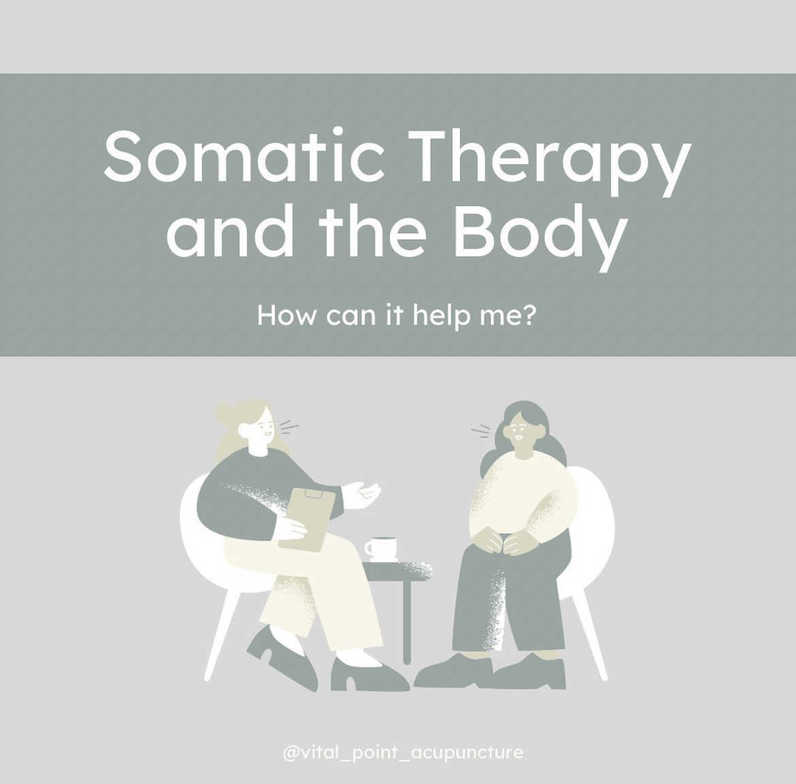
When it comes to addressing our well-being, many of us feel more comfortable seeking help from health practitioners who primarily focus on the body (doctors, acupuncturists, massage therapists, chiropractors, etc). But when it comes to seeing a counsellor or therapist, it can feel more daunting. In this blog post, we'll explore the reasons behind why this may be, shedding light on why seeking counselling or psychotherapy might not feel as accessible or safe for many. We'll also dive into the benefits of somatic therapy, which serves as a bridge between body-focused practices and traditional therapy.
But first, what is somatic therapy?
Somatic therapy is a holistic approach that recognizes the mind-body connection. It integrates body-focused techniques to address emotional and psychological well-being. By reconnecting individuals with their bodily sensations and emotions, somatic therapy helps release stored trauma in the body, promotes regulation of the nervous system, and increases body awareness and mindfulness. It offers a unique and effective way to heal and foster self-awareness and resiliency.
Tangible Symptoms and Physical Manifestations:
When we experience physical discomfort or symptoms, such as pain, fatigue, or digestive issues, it's often easier to recognize and acknowledge these as tangible signs.
Body-focused health practitioners specialize in diagnosing and treating these physical manifestations, providing immediate relief and concrete solutions. However, somatic therapy recognizes that physical symptoms can be interconnected with emotional and psychological well-being. By integrating somatic therapy into their practice, counsellors and therapists can help individuals explore the mind-body connection and address both the physical and emotional aspects of their well-being.
How Somatic Therapy Can Help:
Healing from Trauma:
Somatic therapy helps individuals heal from trauma by supporting the safe release of stored trauma energy, allowing individuals to complete the physiological responses that were interrupted during an initial traumatic event. This process leads to resolution, empowerment, and a sense of relief from trauma-related symptom
Regulation of the Nervous System:
Somatic therapy focuses on regulating the autonomic nervous system, which plays a crucial role in our physical and emotional well-being. Through gentle body-oriented techniques and awareness practices, balance can be restored to the nervous system, reducing the symptoms of chronic stress, anxiety, and hypervigilance. This regulation also supports overall well-being and enhances the body's natural healing capacities.
Addressing Physical Symptoms:
Somatic therapy recognizes that physical symptoms and ailments can be linked to unresolved emotional experiences and trauma. By exploring the link between bodily sensations and emotions, somatic therapists assist individuals in understanding how their emotional and psychological well-being can affect their physical health. Through this process, individuals can gain deeper insight into the underlying causes of physical symptoms, promoting a holistic understanding of their overall well-being.
Increasing Body Awareness and Mindfulness:
Somatic therapy cultivates a greater sense of body awareness, allowing individuals to develop a more profound connection with their embodiment. By learning to listen to and trust the wisdom of their bodies, individuals can better recognize early signs of stress, tension, or discomfort. Practicing this mindfulness can also enhance the engagement in self-care and overall relaxation.

Why People Don’t Choose Counselling:
Cultural Conditioning and Stigma:
Society's conditioning often places greater emphasis on physical health and resilience while overlooking mental and emotional well-being. Seeking support for physical ailments aligns more with societal norms, as it's seen as taking responsibility for one's health.
Somatic therapy challenges this dichotomy by acknowledging the importance of the mind-body connection. Through a somatic therapy approach, there is a bridge that allows individuals to address their emotional and psychological well-being in a way that aligns with their comfort levels and societal expectations.

Lack of Mental Health Literacy:
Compared to physical health, mental health literacy remains limited in many communities. People may be more familiar with symptoms of physical illnesses and the corresponding treatment options, while psychological distress can be misunderstood or misinterpreted. Somatic therapy not only addresses mental health concerns but also educates individuals about the mind-body connection. By integrating somatic principles into therapy sessions, therapists can foster mental health literacy, helping individuals understand the impact of emotions on their overall well-being.
Vulnerability and Emotional Exposure:
Seeking support from counsellors or psychotherapists requires vulnerability and a willingness to explore deep emotional terrain. This level of emotional exposure can feel uncomfortable and challenging, especially for those who have been conditioned to suppress or avoid emotional expression. Somatic therapy, with its focus on the body, offers an alternative path to accessing and addressing emotions. By incorporating somatic techniques, therapists provide a space where individuals can explore emotions through bodily sensations, movement, and breath, offering a bridge for those who may be hesitant to engage in traditional talk therapy.
Somatic therapy is a powerful modality that recognizes the intimate connection between the mind and body. Not only is it a processing tool for emotional trauma, but it can also offer profound healing and relief, particularly for individuals experiencing physical ailments and other challenges.
If you're curious about Somatic Therapy and would like to schedule a free 15 minute discovery call to find out more you can book an appointment easily online or reach out to us at info@vitalpoint.ca

Samasati Kiya
Contact Me


